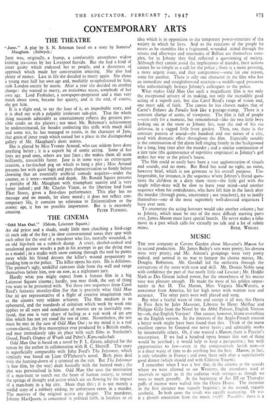CONTEMPORARY ARTS
THE THEATRE
"Jane." A play by S. N. Behnnan based on a story by Somerset Maugham. (Aldwych.)
JANE was, originally, a frump, a comfortably amorphous widow knitting tea-cosies by her Liverpool fireside. But she had a kind of inner gaiety which endeared her to people, and a directness of approach which made her conversation amusing. She also had plenty of money. Late in life she decided to marry again. She chose a young man half her own age and, modishly re-upholstered by him, took London society by storm. After a year she decided on another change: she wanted to marry, en troisiemes noces, somebody of her own age. Lord Frobisher, a newspaper-proprietor and a man very much about town, became her quarry, and in the end, of course, she got him.
It is a slight and, to say the least of it, an improbable story, and it is eked out with a palpably irrelevant sub-plot. That the whole thing succeeds admirably as entertainment reflects the greatest pos- sible credit on the players ; nor must Mr. Behrman's achievement be underestimated, for besides confecting this trifle with much skill and some wit, he has managed to retain, in the character of Jane, that grain of inner truth which earned her a place in the distinguished gallery of Mr. Maugham's short stories. She is played by Miss Yvonne Arnaud, who can seldom have done anything better ; it is a superb bit of comic acting. Some of her lines are good ones, others are just lines ; she makes them all seem brilliantly, irresistibly funny. Jane is in some ways an extravagant creation, a far-fetched peg on which to hang a plot ; Miss Arnaud presents her with quiet logic and puts characterisation so firmly before clowning that an essentially artificial comedy acquires—under the counter, as it were—warmth and depth. Mr. Ronald Squire presents a pastiche of Mr. Maugham with triumphant suavity and is .very funny indeed ; and Mr. Charles Victor, as the libertine lord from Fleet Street, gives a first-class performance. This play has no message and no morals, let alone moral ; it does not reflect con- temporary life, it contains no reference to Existentialism or the atomic age, it has no possible importance. But it is extremely


































 Previous page
Previous page